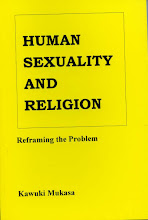They call them "fringe events" because they are outside the formal agenda of the conference. They are part of the chaos that is common at any conference. But the magnitude of this one both in terms of its length and number of official participants, prompts the organizers to bring some order to the choas, hence the formal track of registered fringe events designed to manage the chaos on the fringes.
To be a registered fringe event comes with certain privileges: there is some access to and support from the conference staff. There is also access to a wide range of conference tools including the venue, communication facilities, promotion and others. These do indeed make up a considerable part of the overall budget of the conference.
There are, however, limits for the fringe-event organizer, particularly at this conference. The security is very tight. One of the organizers told me that there are people who have travelled to this city to cause disruption or to embarrass certain bishops. So the staff are doing everything possible to prevent any disruption. That means tight security. For example, it is almost impossible to have access to the bishops unless you happen to run into them along the pathways on the Campus or in the marketplace - which is open to the public. My original plan was to get to the university campus and track down one by one the twenty or so bishops who will be participating in my fringe event. I have since abandoned that course because I have no access to any of the buildings except the one where my event will be taking place and the one where the marketplace is located. Fortunately for me, I have some access to the inner-sanctum of the team that is running things around here: two of my colleagues are part of the volunteer staff team and one of them is helping me to relay messages to those bishops. This has lowered my anxiety considerably.
The notion of "fringe events" may lead to the assumption of a hierarchy of events. In other words, that you have your important mainstream events which are part of the formal agenda and then the fringe events that are not as significant. That is in fact a false assumption. Some of these fringe events are very serious and could have a significant impact on the outcome of the conference.
My event, for example, is bringing together approximately twenty bishops/Archbishops and their spouses, mostly from Africa and Canada, but also from Australia and Asia. They will attempt to reflect on what it means to be in companionship with one another; what it means to carry one another's burdens in the current climate of strained relationships in the Anglican Communion? Do we need new conceptual tools, new ways of understanding some of the older concepts such as partnership, mutuality, relationship and so on? It is as serious a conversation as you will see at this conference. As a matter of fact, we now have a rather curious problem. Twenty bishops and their spouses is just about all we can handle at this event. That is what we are prepared for anyway. Yet there are many other bishops now who have heard of this event and are asking whether they should come. Fortunately, that is not my decision to make one way or the other.
It will be the beginning of a conversation. There will be no resolutions or proposed changes in policies but hopefully a commitment to continue the conversation.
Tomorrow, if you'll endulge me, I would like to vent about something that has bothered me since I arrived here.
Blessings
Subscribe to:
Post Comments (Atom)





No comments:
Post a Comment